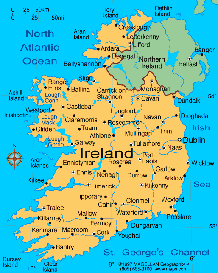EDUCATION
- Irish influence on western education began 14 centuries ago.
- From the 6th to the 8th century, when western Europe was largely illiterate, nearly 1000 Irish missionaries travelled to England and the continent to teach Christianity.
- University education in Ireland began with the founding of the University of Dublin, or Trinity College, in 1592.The National University of Ireland, established in 1908 in Dublin, has constituent university colleges in Cork, Dublin and Galway, another leading college is Saint Patrick's College (1795), in Maynooth, affiliated with the National University.
- The Irish language has been taught in all government subsidized schools since 1922, but fewer than 10,000 pupils speak it as their first language.
- Ireland has a free public school system, with attendance compulsory for all children between 6 and 15 years of age.
- Ireland also has several state-subsidized training colleges, various technical colleges in the larger communities and a network of winter classes that provide agricultural instruction for rural inhabitants.
- Ireland’s long tradition in educational excellence is recognized the world over.
- Attendance at full time education is compulsory in Ireland from six to fifteen years of age and is free in the majority of primary and secondary level schools, and at undergraduate third-level3.
- Education is considered a fundamental right under the constitution.
The Irish Education System is divided into three levels given as:
- Primary (6 years)
- Secondary (5 or 6 years)
- Third level which offers a wide range of opportunities from post-secondary courses, vocational and technical training, full degree and the highest post-graduate levels.
ACADEMIC ENTRY REQUIREMENTS
- Access to third-level education is highly competitive in Ireland.
- Entry requirements for courses tend to vary from year to year, depending on the number of places available and the number of applicants, thus there exists a great deal of competition for the more sought after programs.
Overseas students wishing to study in Ireland have two options given as:
- Attend upper secondary school in Ireland and complete the Leaving Certificate examination with Irish students. This route is chosen by a number of students who may take the examination in conjunction with English language tuition.
- Undertake recognised public examinations in their own countries. This is the more common route and it is essential that every applicant check that the educational qualifications she/he is presenting are adequate to satisfy entry requirements.
PERCENTAGE REQUIRED
- Certificate/Diploma- 50%-55%
- Bachelor- 55%-60%
- Master- 55%-60%
LEVEL OF ENGLISH
You must show that you have the capacity to fully partake in your chosen course through the medium of English and satisfy the Visa Officer in this regard.
The recommended band scores are:
- IELTS - minimum score of 5
- TOEFL - minimum score of 173
- Cambridge - First Certificate in English (FCE) or higher
- Many universities and colleges provide English Language training programs.
IELTS REQUIREMENT
- Certificate/Diploma- IELTS 5.0-IELTS 5.5
- Bachelor course- IELTS 6.0
- Master course- IELTS 6.5
- Law course- IELTS 6.5
- Education course- IELTS 6.5-IELTS 7.0
- Nursing course- IELTS 6.5-IELTS 7.0
POPULAR COURSES
- Business
- Information Technology
- Engineering
- Education
- Health Sciences
DURATION OF COURSES
- Certificate/Diploma- 1 year-2 years
- Bachelor course- 3 years
- Master course- 1 year



